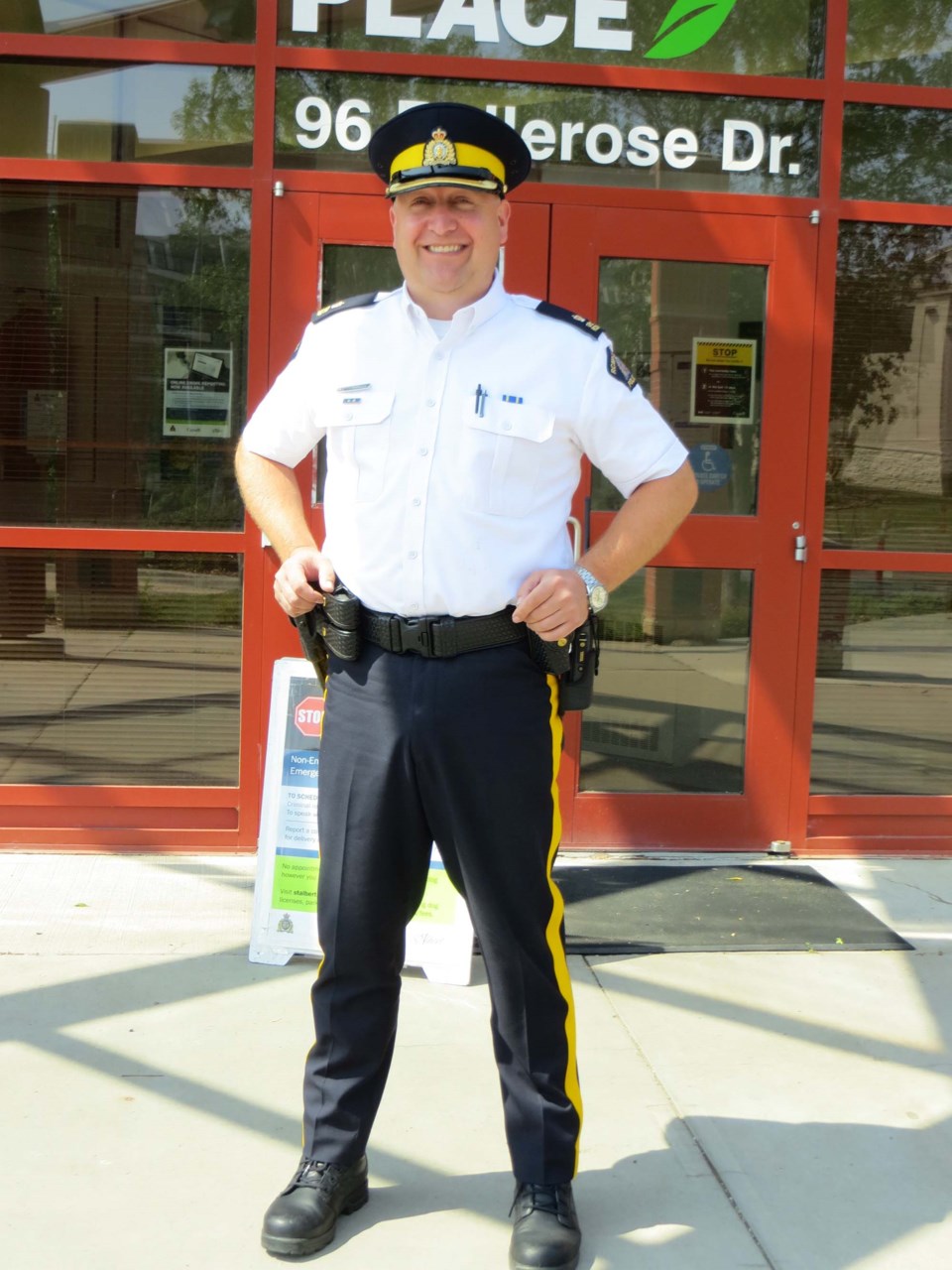Local policing focused on deterring crime rates and responding quickly to mental-health and domestic-violence calls this spring, according to data released by the St. Albert RCMP.
In a comparative analysis between the 2020 and 2021 first quarter from April to June, the detachment recorded a drop from 177 domestic-violence occurrences last year, to 156 this spring. That translates to a 12-per-cent decrease.
Instead, there was an uptick in mental-health services, from 117 occurrences last year to 124 in 2021. The result is a six-per-cent increase.
Property crime, defined as break and enter, theft under $5,000, and mischief to property, also took a downturn. Last year, the detachment recorded 576 occurrences while 2021 showed a 10-per-cent decrease, with 520 calls.
“When property crimes are down, it allows us to build capacity on persons crimes, and on mental health and domestic violence. All those categories are up sharply. The draw on my resources is very real at this point,” said St. Albert RCMP Insp. Ryan Comaniuk.
As summer kicks in and people ease their way out of pandemic restrictions and lockdowns, the numbers of property crimes may increase.
“A lot of property crime is crime of opportunity. When people are out and about, sometimes they’ll act on an opportunity, and you have a crime-in-progress. A lot of that is just left to chance.”
He also said statistics can be skewed if a group of prolific offenders visit the city.
“Crime knows no boundaries. Sometimes we’ll have a group that comes to St. Albert and they’ll be active for a few days or a few weeks. Then they move on to another community. In those instances, they impact our statistics.”
Although property crimes are down slightly, the detachment continues to see increased calls for mental-health support. To provide perspective, the detachment received 425 calls for service in 2019. During the COVID lockdown in 2020, calls jumped to 519, a 22-per-cent increase.
“That was the one that really jumped out at me when I started,” Comaniuk said. His concern is numbers continue rising.
“It’s people in crisis. It’s people that have underlying mental-health issues and a lot of times those issues are amplified by drug or alcohol abuse. Or, because they’re a part of a vulnerable community, they don’t have access to front-line services that might be anything from access to a doctor or a psychiatrist or even access to prescription drugs. We see a continued need to focus on them and provide service to vulnerable people.”
On the other hand, domestic violence files are slowing down. Comaniuk commends all the secondary support agencies, such as Victim Services, SAIF, Family and Community Support Services, and the St. Albert Domestic and Violence Community Response Committee for providing the necessary “360-degree wrap-around services” victims require to leave the cycle of violence.
Officers not only deal with the initial call, they also compile interview information, conduct safety planning, and request emergency protection orders. Although Victim Services often provides guidance through the court process, occasionally officers will accompany a victim to court and support them through the judicial process.
He also said community engagement is critical to the success of police work.
“It allows me to get that snapshot in time as to where those concerns are. And let’s face it, it depends on the economy, the weather, the social economic status of Alberta and Canada. It’s important we have ongoing engagement with the community through the policing committee portal. There are all kinds of ways people can express their concerns in policing services.”
The data came from the first Quarter Progress Report for 2021, from April to June, submitted to the St. Albert Policing Committee, offers a more generalized overview in comparison to previous years, which showed a more statistical analysis of city policing.
The change occurred after the detachment lost its analyst to another organization, said Comaniuk.
“I rely on the district and division analyst to provide me with some statistics. Unfortunately, it does hamstring me a bit for the quarterly report the analyst used to prepare. It’s a little less flashy,” Comaniuk said.
“We’re in the midst of doing some succession planning around that position, and I’m working with the city’s policing services manager to fill that spot.”
The spring progress report, a framework to measure police performance, was completed based on three pillars requiring the largest amount of attention. It factored in property crime, mental health, and domestic violence.
Currently, the detachment operates with 70 officer positions and 36 municipal employee support positions. Its 2021 budget is $12.3 million, allocated in a 90/10 split between the municipality and the federal government. The city is responsible for supplying 90 per cent of the budget, at $11.1 million. The federal government tops it up with the final 10 per cent at $1.2 million.




